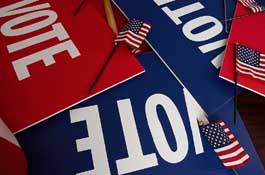California open primary initiative continues to generate vigorous debate

With the June election fast approaching, political analysts both in and outside California are scrambling to offer their opinions on the contentious “Top Two Open Primary”. While the battle lines remain more or less the same in terms of allies and foes, this increased barrage of press coverage has allowed for new evidence to come to light regarding the efficacy of the system, especially where previous statewide efforts at implementing it are concerned.
Moreover, these various editorial positions represent a useful cross-section of mature arguments for both sides of the issue, enabling voters to engage it on a more comprehensive level.
To begin with, writing from Washington (the state, not the city), commentator John Laird has celebrated the program as an “antidote to rancor,” suggesting that it enables a more moderate set of politicians to come to power. “Top two primaries reduce partisan extremism by forcing candidates to appeal to all voters, especially independents, instead of courting the fringe wing-nuts, as we see in party primaries,” Laird writes.
Quoting another editorial, he also suggests that “California’s political system is broken” because “the right wing blindly blocks attempts to raise new revenues through taxes. The left wing just as blindly protects organized labor and social programs with little regard for the fiscal cost.”
Granted, there is something slightly odd about the description of aversion to taxes as “right wing”, given that California is currently the most taxed state in the nation, but this inconsistency does not appear to trouble Laird. More oddly, though, given his aversion toward “rancor,” Laird concludes the column by derisively suggesting that enemies of Top Two Primaries “dangle the tea bags from your hat brim, paint some placards, limber up the larynx and head on down to the town square for some more hollerin’.”
This set of arguments is likely a good preview for the sort of evidence which can be expected from proponents of the measure. That is, at the comparative level, Washington’s system will likely be praised for its moderation, and the prospect of said moderation entering California politics will be trumpeted as one of the bill’s advantages. The current fiscal rancor in the state will also be held up as an example of an area where “moderation” is (supposedly) desperately needed.
However, opponents of the measure can also find comfort in a recent Stateline.org article written by Louis Jacobson. The piece by and large maintains a balanced tone, but there are tidbits of it which will likely alarm potential voters enough to give the Top Two Primary’s opponents a fighting chance.
For instance, writing about the erstwhile Louisiana “Jungle Primary” (their name for a Top Two Primary), Jacobson notes that “the system helped the candidacies of white supremacist David Duke for a U.S. Senate seat and a gubernatorial race.” In terms of sheer shock value, this fact is likely to be trumpeted by the bill’s opponents, though it may carry an unintended argument for the proposition.
Contrary to the charge of critics like Ralph Nader, for instance, it could be claimed that while Duke’s candidacy was objectionable, the fact that it could be more successful in a Top Two Primary than in a Party Primary is evidence that third party candidates, however extreme, can triumph in the right political environment. This, however, carries a possible weakness for the proposition as well, since Duke’s success also refutes the notion that moderation necessarily thrives in Top Two systems.
Such coverage is likely to continue well into June, and will likely only complicate the question of Proposition 14. However, voters are advised to keep their heads on straight and try to sort the actual policy implications from the rhetoric as much as possible.




